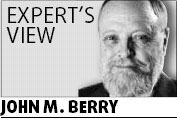There's no reason to expect US will go into recession in '08
Some analysts were predicting a recession would hit the US economy in the fourth quarter as consumers, hurt by falling house prices and the high cost of gasoline, cut spending.
It didn't happen, and there's no reason to think it's going to this year either.
Economic growth will be slow in the first half of 2008, and the unemployment rate, which was still a low 4.7 percent in November, is likely to rise. Housing sales and construction will continue to be a drag for months to come.

On the other hand, economic growth should accelerate in the second half of the year as financial-market conditions and the US trade deficit improve, the housing drag lessens and the effect of the 100-basis-point cut in the Federal Reserve's overnight lending-rate target in recent months begins to kick in.
Some optimistic analysts believe growth might rebound to a 3 percent rate in the second half.
Given the turmoil in financial markets, the risk of a recession is hardly zero. Nevertheless, the current state of the economy simply doesn't show the signs usually associated with one.
In a forecast released on Wednesday, Mickey D. Levy, chief economist at Banc of America Securities, said most recessions have begun after the Federal Reserve raises interest rates and "generates a slump in aggregate demand".
"As a result, expansion peaks tend to be characterized by overhangs in inventories, too many employees and excess capital stock relative to output," Levy said.
None of those conditions exists in the US economy and the Fed has eased to the point that rates are "now consistent with sustained growth in demand", he said.
Many of the forecasts calling for a recession are based on an assumption that large losses associated with subprime mortgages and the securities backed by them will force banks to reduce lending big time. The resulting credit crunch will undermine business investment and consumer spending, the forecasters say.
There are scant signs of that happening.
The summary of the most recent survey of economic conditions conducted by the National Federation of Independent Business and released on December 11 said: "There is no 'credit crunch'.
"Only 3 percent of the owners cited the cost and availability of credit as their number one business problem," the summary said. "Thirty-four percent reported all their credit needs met compared to 4 percent who reported problems obtaining desired financing, typical of readings for the past few years."
According to Levy, the same is true for many customers of big institutions hurt by subprime losses.
"Large banks have adjusted their portfolios, but they haven't reduced their regular lending," he said. They have cut back the leverage and lines of credit to hedge funds, venture capital funds, mortgage brokers and the housing sector.
"But to the rest of the non-financial sector they are making all the good loans they can while applying their existing lending standards more rigorously," Levy said. "And as far as I can tell, the 8,000 or so other banks are largely unaffected by this."
Instead of a slump in consumer spending and the beginning of a recession, households increased their outlays at a 2.5 percent annual rate in the fourth quarter, possibly more, according to estimates by a number of economists.
On December 26, Macroeconomic Advisers said consumer spending probably rose at a 2.8 percent rate, enough to offset housing's drag and some decline in business inventory accumulation.
The gross domestic product probably increased at a 1.1 percent pace in the fourth quarter and will do slightly better in the first quarter, the firm said.
"The resilience of consumer spending augurs well for an eventual rebound to trend GDP growth in 2008 that will be supported by a gradual improvement in credit markets, dissipating drag from housing, declining energy prices, and a monetary policy stance that moves into outright accommodation," they said.
Levy also expects Fed officials to cut their lending-rate target to 3.75 percent, 50 basis points lower than the current 4.25 percent. The next Federal Open Market Committee meeting is January 29-30, and on December 31 investors in fed funds futures contracts put a 92 percent probability of a 25-basis-point cut by the committee.
Some more pessimistic analysts, such as Paul McCulley, fund manager at Pacific Investment Management Co, expect the economy to be so weak this year that the Fed will be forced to reduce the target several times. In a December 28 interview, McCulley said a 3 percent target "makes a fair amount of sense".
Whatever Fed officials do, they will continue to have one eye cocked on inflation.
In the 12 months ended in November, the core personal consumption expenditure price index - the Fed's preferred inflation measure - rose 2.2 percent, more than the 1.6 percent to 1.9 percent goal of various FOMC members.
The core consumer price index, which excludes food and energy items, rose 2.3 percent over the same period. With energy costs up a huge 21 percent and food higher by 4.7 percent, the overall CPI increased 4.3 percent.
Levy offers some solace, saying he expects the change in the core PCE index to drop to only a 1.7 percent gain this year.
Such a slowing of inflation and a rebound in economic growth would bring a deep sigh of relief at the Fed.
John M. Berry is a Bloomberg News columnist. The opinions expressed are his own.
(China Daily 01/04/2008 page16)














